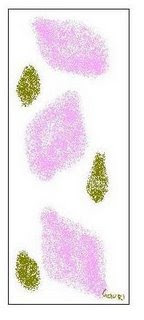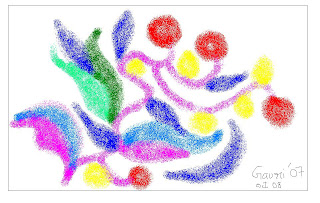We are treading on controversial grounds. Yes. I announce so and throw my hands up right before starting to write this piece. But write I will, however controversial (or obvious) though it may sound...
For the Bangla community, lunch is an occasion in itself. Never before have I seen being served course after course of veg and non-veg items with that typical laid back attitude. You will be served bhaat* in huge quantity along with a generous serving of dal and other vegetables, only to be reprimanded later if you don't eat enough of maachh , mangsho and chicken in the next serving accompanied by another generous handful of rice. Then there's the chutney to round up the meal and finally a mishti. Delicious. Nothing controversial here. So let's proceed.
Now imagine there's a widow in the group. Generally, there are at least two or three widows in a party, however big or small it may be, and that's a personal observation. So what happens? Just when the tables and chairs are being pulled for the lunch, someone starts calling, "Niramish? Who's niramish? How many? O, three. Fine, we will set the tables here".
For a moment, at least for me, there's a sudden thud in the festive mood. I have been pondering about this niramish business ever since I was a notun bau, even perplexed at times, at this accepted, sometimes even seemingly advocated practice of niramish for the widows...
What's niramish? For the uninitiated, it's vegetarian food, ideally even without onions and garlic. A person may be even vegetarian by choice, by the virtue of growing up in a certain environment or values. But the niramish that I am discussing here is not that sort of vegetarianism. You know, a woman becomes a hardcore vegetarian overnight in these parts of the country. Even today.
Once your husband is dead, consider your taste buds dead too. And make no fuss about it. You are expected to be that ideal wife forever and 'prove' just what a control-freak eve you can be in the absence of your dear husband.
So when, after growing up as a hardcore non-vegetarian (yes- I read somewhere that 95% of the people in Kolkata prefer non-veg food) for a good forty fifty years of your life, could be more, or could be unfortunately even less, once you are a widow- you are expected to give up on the kind of food you grew up eating. Maach, Mangsho and Murgi. Let's not forget eggs and seafood and such alike. The Bengalis seem to eat anything and everything with gusto, but for the women, unfortunately, there could be a sudden fullstop.
Do taste-buds die with the death of the husband? Is it essential to give up on good food to prove you are a good widow? What is behind this tradition of Niramish in Eastern India? Are we really a progressive nation or we prefer to ignore things right under our nose? Am I biased or common sense just doesn't hold true these days?
It's matter of choice and assertion then. I have seen at least two widows who prefer not to follow the seemingly idiosyncratic flow of thought and ideals. And this time, I also heard a gutsy lady ask another rhetorically, "Hey, they served the chicken pakoras first and then the vegetable chop, both cooked in the same kadhai. Now don't tell me they changed the oil"...
I guess that sums it all. I could go on and on about this, but then, it's a matter as simple as that of choice- unduly complicated by the burden of age-old practices and a politics of discriminatory behaviour.
I have written what I have witnessed; understood and argued relying on some very basic common sense- just like the one the lady demonstrated above. There are other important issues of personal choice, preference and the right to enjoy life to the full- as an individual and not as someone's wife, mother or daughter-in-law.
What's important is to speak up, perhaps more importantly, at least let others speak up and stand for themselves if you yourself don't have the gumption... In matters like these, it seems sometimes that a woman is a woman's worst enemy.
What do you think? Bangla bhayro and bonro, a special invitation to you to comment...
*Bhaat= RiceDal= A thin lentil preparation
Maach= Fish
Mangsho= Any kind of meat, referred to mutton in particularMishti= Any sweet dish
Niramish- Vegetarian food, ideally without onions and garlicNotun bau- Newly wed daughter- in law
Pakoras= An Indian deep-fried snack
Kadhai= A deep vessel, normally used to cook food or for deep-frying
Bhayra and Bonra= Brothers and sisters (information courtesy- constant political rallies :)
For the Bangla community, lunch is an occasion in itself. Never before have I seen being served course after course of veg and non-veg items with that typical laid back attitude. You will be served bhaat* in huge quantity along with a generous serving of dal and other vegetables, only to be reprimanded later if you don't eat enough of maachh , mangsho and chicken in the next serving accompanied by another generous handful of rice. Then there's the chutney to round up the meal and finally a mishti. Delicious. Nothing controversial here. So let's proceed.
Now imagine there's a widow in the group. Generally, there are at least two or three widows in a party, however big or small it may be, and that's a personal observation. So what happens? Just when the tables and chairs are being pulled for the lunch, someone starts calling, "Niramish? Who's niramish? How many? O, three. Fine, we will set the tables here".
For a moment, at least for me, there's a sudden thud in the festive mood. I have been pondering about this niramish business ever since I was a notun bau, even perplexed at times, at this accepted, sometimes even seemingly advocated practice of niramish for the widows...
What's niramish? For the uninitiated, it's vegetarian food, ideally even without onions and garlic. A person may be even vegetarian by choice, by the virtue of growing up in a certain environment or values. But the niramish that I am discussing here is not that sort of vegetarianism. You know, a woman becomes a hardcore vegetarian overnight in these parts of the country. Even today.
Once your husband is dead, consider your taste buds dead too. And make no fuss about it. You are expected to be that ideal wife forever and 'prove' just what a control-freak eve you can be in the absence of your dear husband.
So when, after growing up as a hardcore non-vegetarian (yes- I read somewhere that 95% of the people in Kolkata prefer non-veg food) for a good forty fifty years of your life, could be more, or could be unfortunately even less, once you are a widow- you are expected to give up on the kind of food you grew up eating. Maach, Mangsho and Murgi. Let's not forget eggs and seafood and such alike. The Bengalis seem to eat anything and everything with gusto, but for the women, unfortunately, there could be a sudden fullstop.
Do taste-buds die with the death of the husband? Is it essential to give up on good food to prove you are a good widow? What is behind this tradition of Niramish in Eastern India? Are we really a progressive nation or we prefer to ignore things right under our nose? Am I biased or common sense just doesn't hold true these days?
It's matter of choice and assertion then. I have seen at least two widows who prefer not to follow the seemingly idiosyncratic flow of thought and ideals. And this time, I also heard a gutsy lady ask another rhetorically, "Hey, they served the chicken pakoras first and then the vegetable chop, both cooked in the same kadhai. Now don't tell me they changed the oil"...
I guess that sums it all. I could go on and on about this, but then, it's a matter as simple as that of choice- unduly complicated by the burden of age-old practices and a politics of discriminatory behaviour.
I have written what I have witnessed; understood and argued relying on some very basic common sense- just like the one the lady demonstrated above. There are other important issues of personal choice, preference and the right to enjoy life to the full- as an individual and not as someone's wife, mother or daughter-in-law.
What's important is to speak up, perhaps more importantly, at least let others speak up and stand for themselves if you yourself don't have the gumption... In matters like these, it seems sometimes that a woman is a woman's worst enemy.
What do you think? Bangla bhayro and bonro, a special invitation to you to comment...
*Bhaat= RiceDal= A thin lentil preparation
Maach= Fish
Mangsho= Any kind of meat, referred to mutton in particularMishti= Any sweet dish
Niramish- Vegetarian food, ideally without onions and garlicNotun bau- Newly wed daughter- in law
Pakoras= An Indian deep-fried snack
Kadhai= A deep vessel, normally used to cook food or for deep-frying
Bhayra and Bonra= Brothers and sisters (information courtesy- constant political rallies :)








